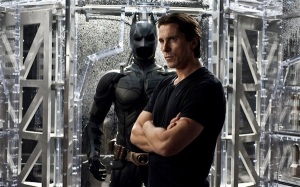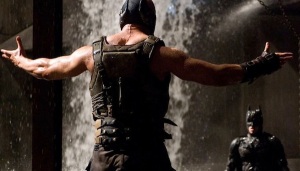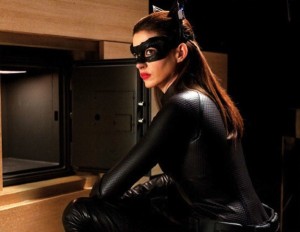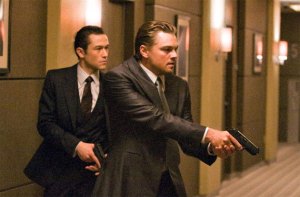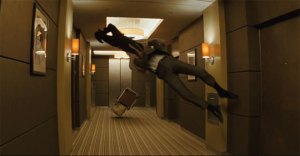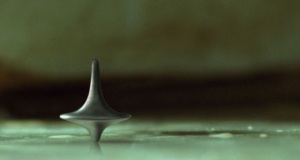
Has the future started yet? I was wondering that yesterday, when I pulled out my iPhone (4 not 5, i'm not that hip), and watched as a little blue dot representing me on a GPS tracked my progress to a theatre, where I'd see a movie using a ticket I had purchased out of thin air with my phone. All of this, accomplished with a few taps of the finger. Sure, it's not teleporters and laser guns, but the gap between our present, and the expectations older generations had for it, is rapidly closing.
Which is probably why science fiction keeps coming back to the few ideas that have always seemed beyond our reach, like time travel. For as insane, probably impossible, as its existence might be, we've gone out of our way to make sure that whoever figures it out first can just watch a movie or read a book to figure out who got it right. It could turn out as simple as Back to the Future, or as paralyzingly complex as Primer. What makes Rian Johnson's take on the concept, Looper, so fascinating, is that it's interested in the motives behind time travel, not just the mechanics.

As futuristic assassin Joe (Joseph Gordon-Levitt) lays out matter-of-factly, time travel is a part of life 30 years from now, even if it won't be invented for another 60. Crime lords of the year 2074 maintain a monopoly on the technology, using it to extradite troublemakers from their time to 2044, to be eliminated by low-level triggermen called loopers. A high-ranking transplant from the future, Abe (Jeff Daniels), organizes the hits, and was responsible for setting an orphaned Joe on a path: be at the right place, at the right time, and dispose of the anonymous person who appears there. Do that, and you're rewarded with money, respect, and any number of immediate pleasures.
The opening act is like a good piece of pulpy short fiction, showing us what would happen if the noir-influenced world of Johnson's first film, Brick, were left to rust. Kansas of 2044 is all blown-out windows and busted rain gutters, where the sign outside the local looper gin joint, La Belle Aurore, is written in font you'd find on the cover of any James Ellroy novel. It's a world going to hell slowly enough to not cause a panic, just a creeping sense of dread, and the drapes change every few years so that no one notices that the building is burning down around them.

"Most loopers aren't the forward-thinking type," Joe says of his colleagues (tellingly, the looper weapon of choice, retro blunderbusses, only have a range of 15 yards), but he's almost as short-sighted as they are. Despite his greater awareness of what the world has become, and where it is heading, Joe just uses this knowledge to rationalize his own series of bad, self-interested decisions. If the party is almost over, might as well get yours before the music stops. As part of his contract, Joe will eventually have to kill his future self, sent back in time to 2044 in order to wipe out any evidence they ever existed. Failing to "close the loop" has fatal consequences for both vintages of the looper, as evidenced by a gut-churning sequence where an older looper on the lam dissolves, bit by bit, as his former self is slowly butchered.
When Joe botches the hit on his future self (Bruce Willis), they both become targets, the difference being that Older Joe comes with a mission: find those responsible for sending him back from 2074, and kill them in the past. And just when you think Looper is going to reach for the throttle, Johnson reins it in, and starts to pull the rug out from under you. There are still a number of gritty and violent shootouts ahead, and plenty more time-bending logistics, but instead of turning up to full boil, Looper settles into a slow burn, and Johnson's stylish action flick transforms into a sci-fi-infused character study.

That two key pieces of the ensemble -a steely farm owner (Emily Blunt) and her gifted son (Pierce Gagnon)- aren't introduced until the midpoint shows the deliberate measures Johnson takes to invest us in the story of a man literally at war with himself. Willis, as the world-weary Old Joe, at first seems like the embodiment of all the signposts from the future that Young Joe has been ignoring, a living warning of what a life of nihilistic complacency can lead to. Yet Johnson constructs his characters with deep histories- not just backstories, but lifetimes of hard choices and tragedy, made apparent through a line of dialogue, or just a look. What becomes clear is that the events of the past aren't what's obdurate, it's the people.
With nods to Akira, Twelve Monkeys and even a bit of Superman, Johnson's eclectic tastes are fuelled by just the right amount of the quirk that overwhelmed many moments of his last film, The Brothers Bloom. And the look recalls another think piece, Tree of Life, only one that backs up the dreamy visuals with some lucid thinking. Well, to a point. The technicals of time travel are mostly elided by Old Joe giving a hand-waving explanation that the exact details are "cloudy."

This will irk purists and create as much discussion about the story's mechanics as its themes, but Looper is so, so much more about the latter than the former. Johnson thinks the world of tomorrow is coming faster than we think, and that's something to be afraid of. When the powerful finale arrives, and three generations of people are forced to make choices about what the future will be, it feels relevant, and urgent. If that's not the hallmark of great science fiction, what is?
5 out of 5
Directed by Rian Johnson
2012, USA




